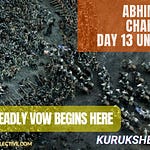Ever watched Mahabharata on TV and thought, "Is this it?" Guess what—you're not alone. Most of us have experienced these epics through abridged books or dramatized serials. But the true, unabridged Mahabharata? It's a different beast entirely. Raw, fierce, shockingly detailed. And today, we're diving into three epic days—days 8, 9, and 10—that transformed this epic forever.
Day 8: Chaos & Courage
Sunrise. Ominous silence blankets the battlefield of Kurukshetra. The air thick with smoke, ash, and the scent of yesterday’s bloodshed. Chariots shattered. Weapons splintered. Warriors lying still, dreams unfulfilled. Yet both sides rise again, resolve renewed.
Bhishma commands the Kauravas. Forms the Mandala Vyuha—a circle impenetrable, built layer by layer with chariots, elephants, and infantry. He's at the center, like the eye of a storm. Opposite him stands Yudhishthira, calm yet tense. Orders the Vajra Vyuha—a diamond to pierce Bhishma’s iron defenses.
The conches roar. Chaos erupts.
Bhishma strikes first. Arrows slicing the air, unstoppable and precise. Entire units collapse in panic. But Bhima isn’t fazed. Fueled by old grudges, he barrels through enemy lines, cutting down Duryodhana's brothers—Aparajita, Kundadhara, Vishalaksha. His arrows scream vengeance, swift and merciless.
Meanwhile, Abhimanyu, Arjuna’s brilliant son, fights beyond his years. Charging fearlessly, arrows precise, chariot unstoppable. Seasoned warriors shrink away. Who could stand before this youthful storm?
Then tragedy strikes. Iravat, Arjuna’s other son, a half-Naga prince, clashes with the Rakshasa Alambusha. Their duel lights up the sky with supernatural fury. In a tragic twist, Iravat falls, courage unmatched, now silenced forever.
Ghatotkacha hears. Rage erupts. The mighty Rakshasa tears through enemy ranks, strikes fear in every heart. Even Duryodhana himself, confronting him, is forced to retreat. And as evening falls, Ghatotkacha weaves illusions so terrifying, warriors see their own deaths and flee in panic.
Night brings uneasy quiet. The Pandavas win some, lose some, but the death of Iravat leaves them shaken.
Day 9: Bhishma’s Unstoppable Wrath
The sun rises blood-red on day nine. Bhishma, more determined than ever, organizes the fearsome Sarvatobhadra Vyuha—circular, defensive, lethal. Pandavas counter with the Srigantaka Vyuha, Shikhandi at the forefront. A calculated move, exploiting Bhishma's vow never to harm someone who had once been a woman.
War drums echo. The armies clash again.
Bhishma’s arrows unleash pure devastation—chariots crushed, elephants scattered, warriors falling like leaves. Pandava ranks tremble. He's unstoppable, a living storm. The Pandavas feel desperation creep in.
But again, Abhimanyu’s brilliance shines. Youthful, swift, relentless. Even the Rakshasa Alambusha, cloaking the battlefield in darkness, can't deter him. Abhimanyu invokes the Bhaskara weapon, piercing darkness with divine light. Alambusha wounded, retreats defeated.
Elsewhere, a duel between Arjuna and Drona, mentor versus student, captivates all. Arrows collide mid-air. A battle of wills, equally matched. Neither yielding. A beautiful yet terrifying ballet of skill and fury.
Bhima’s rage finds outlet again, fighting elephants bare-handed. Grabs a tusk, weaponizing the fallen beasts against their own forces. Blood-soaked, roaring, unstoppable—he embodies raw fury.
Yet Bhishma retaliates harder. Pandavas forced back. Shaken, Yudhishthira even contemplates surrender. Krishna’s calm reassurance restores courage—tomorrow, Bhishma’s reign must end.
That night, a surprising twist. The Pandavas visit Bhishma unarmed. Honoring his vow of truthfulness, Bhishma reveals the secret of his defeat—Shikhandi must lead; Arjuna must strike from behind. Bitter truths. Tough choices.
Day 10: Bhishma’s Fall & Fate’s Turn
Day 10 dawns. A tense stillness. Bhishma knows today might be his last. Kauravas form the Sarvatobhadra Vyuha again, fiercely defensive. Pandavas strategize around Shikhandi—today is their only chance.
Battle erupts with unprecedented ferocity. Bhishma dominates again—arrows like lightning, devastation total. But the Pandavas won't falter. Shikhandi pushes forward, shielded by Arjuna. Bhishma won't retaliate against him—his weakness exposed.
Arjuna confronts Duhshasana, fiercely defending Bhishma. Arjuna wounded, even Krishna bleeds. Angered, Arjuna fights back fiercely, wounding Duhshasana severely, breaking through defenses.
Bhima rampages on the left flank. Kings of Avanti, Magadha, Kamboja fall helpless before his brutal strength. He wields his mace effortlessly, scattering foes in terror. Bhima embodies raw power, unstoppable fury.
Ghatotkacha’s illusions again create chaos, shattering enemy morale. His towering form intimidating, supernatural fury unmatched.
At the center, Drona duels Dhrishtadyumna fiercely, neither yielding ground. Arrows clash, precise and deadly. Warrior’s resolve tested relentlessly.
Meanwhile, young Abhimanyu’s arrows wreak havoc, inspiring Pandava warriors. His youthful courage shifts momentum crucially.
Finally, Shikhandi, Arjuna, and Panchalas close in on Bhishma. Shikhandi fires arrows relentlessly, Bhishma still refusing retaliation. Arjuna seizes the moment, unleashing a devastating volley of arrows. Bhishma falls from his chariot, body pierced, landing upon a bed of arrows—still breathing, his vow unbroken.
A stunned silence grips the battlefield. Bhishma lies fallen, but even in defeat, his voice blesses both sides, reminding all to honor Dharma.
Closing Reflections: Beyond the Battle
Bhishma’s fall marks the war’s turning point—symbolically powerful yet morally complex. Victory tinged with sorrow. Pandavas triumph, yet grieve their beloved grandsire. Each day costs lives, hope, honor. Yet warriors fight on, bound by duty, fate, and dharma.
Mahabharata’s true power lies here—not merely in battles but moral complexities. Unabridged narratives reveal hidden depths, layers TV adaptations cannot capture. Ancient texts hold wisdom relevant today, linking strategic thinking, human psychology, even modern scientific insights.
Now you've glimpsed the real Mahabharata—the grit, valor, tragic sacrifices that TV serials skimmed over.
Remember—abridged is easier, but unabridged holds the heart of truth. That's what these epic days teach us.
Until next time, keep seeking truths—beyond easy stories.
P.S.: Ready to discover more hidden truths of Mahabharata? Stay tuned. Subscribe for deep insights into Hindu epics, beyond the myths and misconceptions.












Share this post